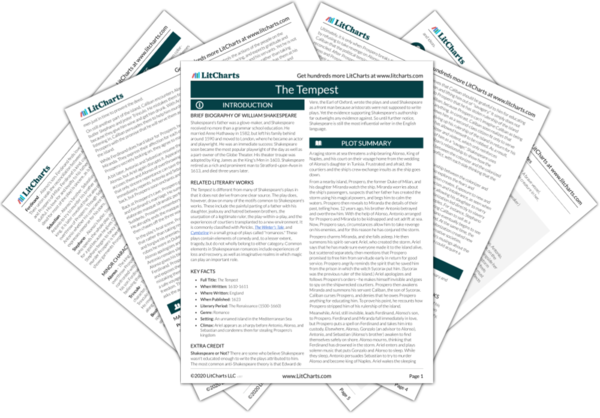During the time when The Tempest was written and first performed, both Shakespeare and his audiences would have been very interested in the efforts of English and other European settlers to colonize distant lands around the globe. The Tempest explores the complex and problematic relationship between the European colonizer and the native colonized peoples through the relationship between Prospero and Caliban. Prospero views Caliban as a lesser being than himself. As such, Prospero believes that Caliban should be grateful to him for educating Caliban and lifting him out of "savagery." It simply does not occur to Prospero that he has stolen rulership of the island from Caliban, because Prospero can't imagine Caliban as being fit to rule anything. In contrast, Caliban soon realizes that Prospero views him as a second-class citizen fit only to serve and that by giving up his rulership of the island in return for his education, he has allowed himself to be robbed. As a result, Caliban turns bitter and violent, which only reinforces Prospero's view of him as a "savage." Shakespeare uses Prospero and Caliban's relationship to show how the misunderstandings between the colonizer and the colonized lead to hatred and conflict, with each side thinking that the other is at fault.
In addition to the relationship between the colonizer and colonized, The Tempest also explores the fears and opportunities that colonization creates. Exposure to new and different peoples leads to racism and intolerance, as seen when Sebastian criticizes Alonso for allowing his daughter to marry an African. Exploration and colonization led directly to slavery and the conquering of native peoples. For instance, Stephano and Trinculo both consider capturing Caliban to sell as a curiosity back at home, while Stephano eventually begins to see himself as a potential king of the island. At the same time, the expanded territories established by colonization created new places in which to experiment with alternative societies. Shakespeare conveys this idea in Gonzalo's musings about the perfect civilization he would establish if he could acquire a territory of his own.
Colonization ThemeTracker

Colonization Quotes in The Tempest
Is, I know how to curse.

Unlock explanations and citation info for this and every other The Tempest quote.
Plus so much more...
Get LitCharts A+Execute all things. For no kind of traffic
Would I admit; no name of magistrate;
Letters should not be known; riches, poverty,
And use of service, none; contract, succession,
Bourn, bound of land, tilth, vineyard, none;
No use of metal, corn, or wine, or oil;
No occupation, all men idle, all;
And women, too, but innocent and pure;
No sovereignty—
...
All things in common nature should produce
Without sweat or endeavour. Treason, felony,
Sword, pike, knife, gun, or need of any engine
Would I not have; but nature should bring forth
Of it own kind, all foison, all abundance
To feed my innocent people.
Sounds, and sweet airs, that give delight and hurt not.
Sometimes a thousand twangling instruments
Will hum about mine ears; and sometime voices,
That if I then had waked after long sleep,
Will make me sleep again; and then in dreaming,
The clouds methought would open, and show riches
Ready to drop upon me, that when I waked
I cried to dream again.
Nurture can never stick...
That has such people in't!
Acknowledge mine.











